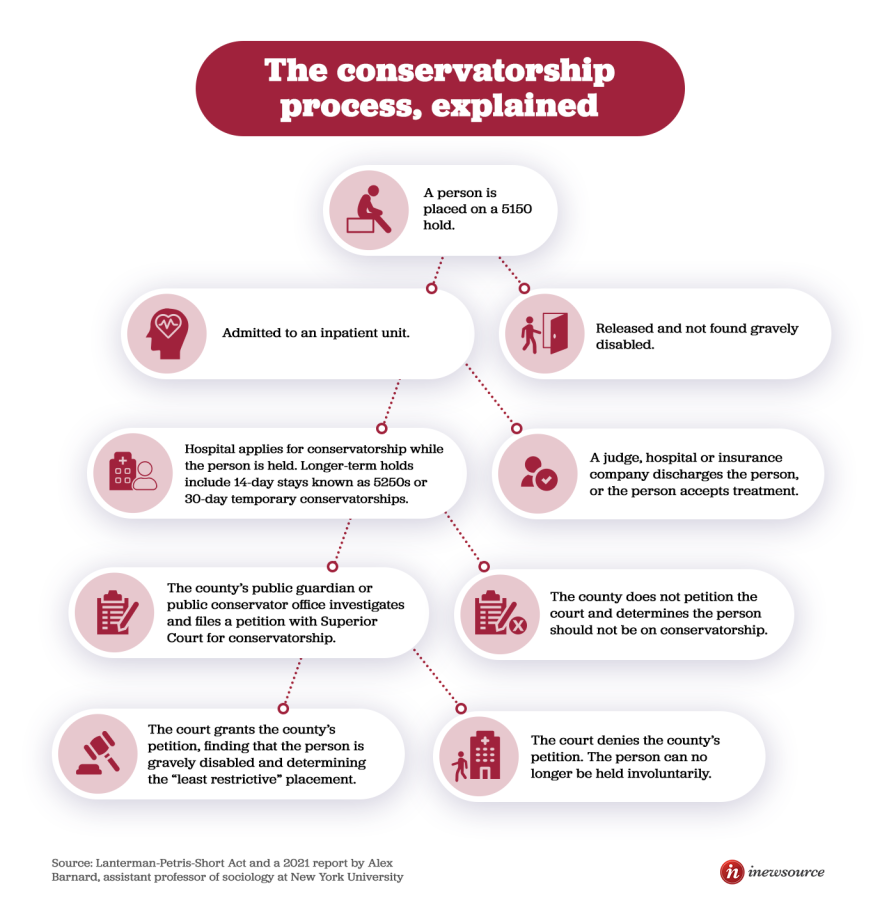If you have been diagnosed with a severe mental illness and are deemed gravely disabled by a qualified professional, you may be placed under what’s known as an LPS conservatorship. inewsource compiled this guide to help people, including those with severe mental illness and their loved ones, navigate the complicated legal process.
Conservatorships are not for everyone, and as inewsource reported, are part of a flawed system. The legal process takes away some of the most significant life decisions a person has — where they can live, if and when they can leave, and medical treatment — and puts them in the hands of others.
This guide provides resources for those interested in learning more. The reporter is not a mental health expert or a lawyer. Readers should consult health and legal experts for additional advice.
About LPS conservatorships
- What’s an LPS conservatorship?
There are different types of conservatorships in California. LPS conservatorships, named after the Lanterman-Petris-Short Act, is a legal process dealing with people who have been diagnosed with a severe mental illness specified in state law. That includes schizophrenia, bipolar disorder, clinical depression and others.
This type of conservatorship is different from probate conservatorships.
Under an LPS conservatorship, someone else can make financial decisions and mandate a person to undergo treatment, such as medication. Often, a county public guardian or similar office can serve as the conservator.
Officials must place a person in the least restrictive environment, but if they determine it’s needed, a conservatee can be held in a locked facility.
Temporary conservatorships last up to 30 days, and counties use that time to investigate whether a longer-term arrangement is necessary. What’s known as permanent conservatorships last up to a year and can be renewed through court on an annual basis.
The LPS Act also governs short-term involuntary psychiatric holds, such as 72-hour holds known as 5150s, and 14-day holds known as 5250s.
Who is eligible?
To be considered for an LPS conservatorship, the person must be diagnosed with an illness listed in the Diagnostic and Statistical Manual of Mental Disorders, such as:
- Schizophrenia
- Bipolar disorder
- Schizoaffective disorder
- Clinical depression
- Obsessive Compulsive Disorder
- Chronic alcoholism
The person must also be considered gravely disabled, meaning they’re unable to care for basic needs such as food, clothing or shelter as a result of their disorder, and unwilling or incapable of accepting treatment voluntarily.
How does someone get placed under a conservatorship?
State law limits who can initiate a conservatorship. It’s not as simple as calling the county and saying your loved one should be considered for one, and a person found gravely disabled doesn’t automatically place them under a conservatorship, either.
Conservatorship proceedings typically begin during a shorter-term psychiatric hold. Sometimes a person has been hospitalized multiple times.
A qualified professional must evaluate the person before referring the case to the public guardian’s office. If the person is in jail, the treating doctor at the jail must initiate the referral.
In San Diego, those petitions are handled by the county Office of the Public Conservator.
The county then conducts an investigation to determine whether the person is a danger to themselves or others and is gravely disabled, as well as possible alternatives to conservatorship. If investigators find that a conservatorship is necessary, the county can petition the court, which has ultimate approval over whether to establish the conservatorship.
People under consideration for conservatorship have the right to an attorney and can request a jury trial to determine whether they are gravely disabled.
Where can I go for help?
Organizations
- Disability Rights California: The nonprofit agency is designated under federal law to advocate for Californians with disabilities, including on conservatorship issues.
- Jewish Family Service: Among the agency’s services is its patient advocacy program. It monitors and works with people receiving behavioral health services at inpatient psychiatric units and other facilities.
- National Alliance on Mental Illness, San Diego and Imperial counties chapter: NAMI San Diego works with family members and their loved ones with mental illness, providing services such as support groups and advocacy work.
- San Diego County Office of Public Conservator: The public conservator’s office receives and investigates petitions for LPS conservatorships. It determines which ones are taken to court for ultimate approval.
Other resources
- Lanterman-Petris-Short Act, which governs LPS conservatorships and short-term psychiatric holds.

inewsource investigative reporter Jennifer Bowman reported this story while participating in the USC Annenberg Center for Health Journalism’s 2022 California Fellowship. A San Diego native, Bowman has covered local government for more than a decade and has worked at inewsource for nearly three years. She typically reports on southern San Diego and Imperial counties.









